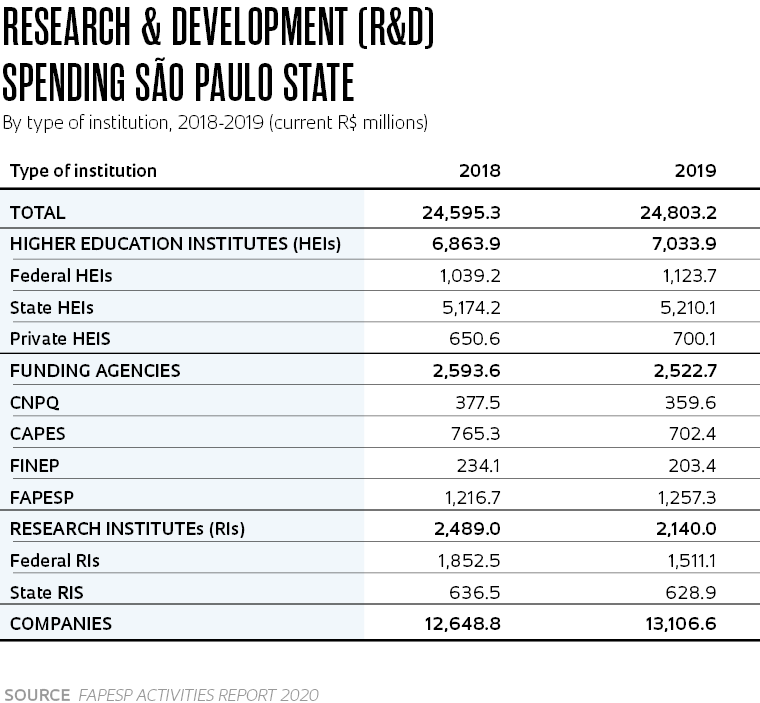In 2020, FAPESP invested R$978.3 million in 21,233 research projects. The total fell short of the R$1,257,288,187 disbursed in 2019, largely due to the impacts of the pandemic, which led to activities being suspended in universities and research labs and halted the work of many fellowship beneficiaries overseas. Another factor was the sharp rise in the dollar, which led to a temporary reduction in imports funded by the foundation.
But the public health emergency also sparked a strong response from scientists in the state of São Paulo, with FAPESP’s portfolio dominated by COVID-19 research in the last year. At the very beginning of the pandemic, the foundation issued public calls for research proposals—as well as calling on researchers who had already received funding—to study the disease in depth and help combat its effects. In partnership with USP, it also contributed to the creation of Brazil’s first database on individuals that tested for COVID-19. At the end of the year, the database contained more than 485,000 records, available to anyone interested in studying the disease’s effects and trajectory.
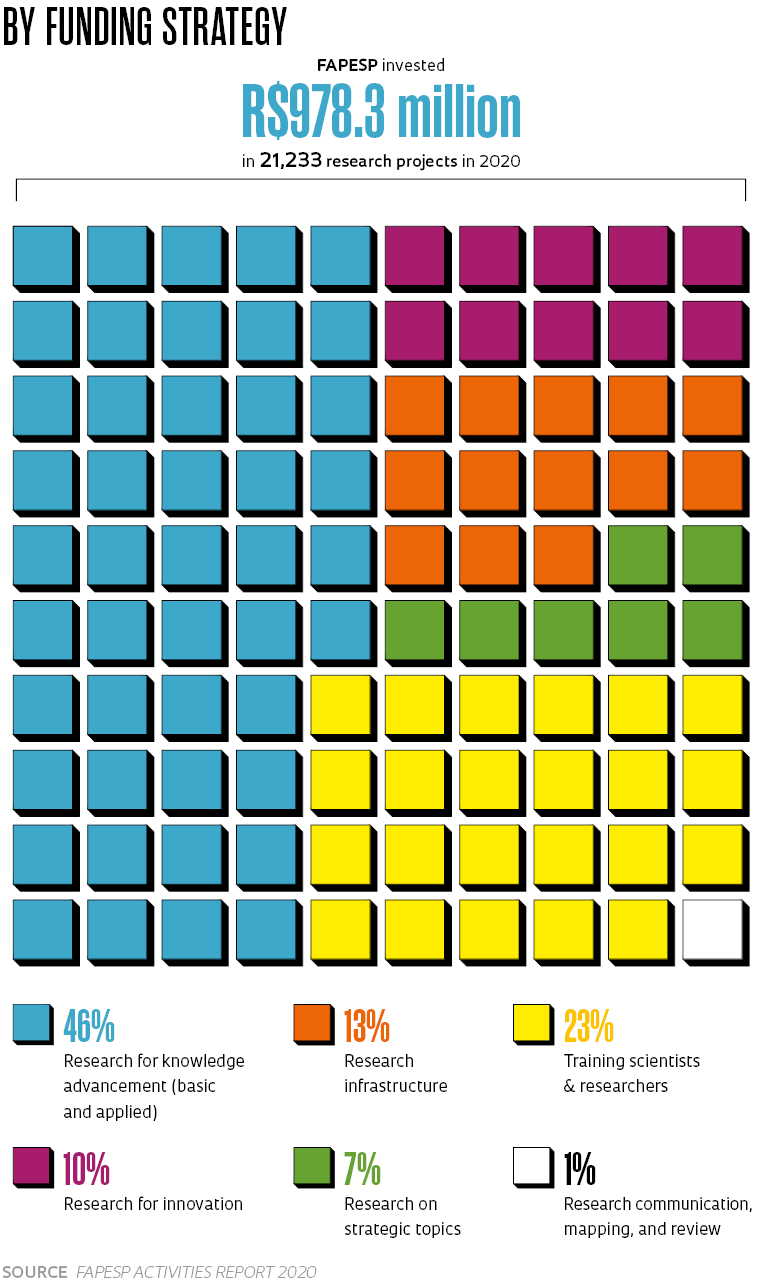
In the race to develop and produce vaccines, FAPESP funded eight vaccine candidates and the phase 3 clinical trials of CoronaVac, produced by the Butantan Institute, as well as studies on the effectiveness of Covishield, a vaccine created by Oxford University and pharmaceutical company AstraZeneca. In partnership with the European Union, it launched a public call for research proposals aiming to identify new therapeutic agents and diagnostic systems for the novel coronavirus. It was also part of the group of leading funding agencies from 25 countries that helped prepare the United Nations (UN) Research Roadmap for COVID-19 Recovery, whose goals are aligned with the UN Sustainable Development Goals (SDGs). “It was a real trial by fire to take on the role of scientific director at FAPESP in the midst of the greatest health crisis of the century and so many uncertainties,” says neuroscientist Luiz Eugênio Mello, whose term began on April 27, 2020.
FAPESP will play a central role in society’s effort to resume development and normality after the epidemic is under control, says Marco Antonio Zago, president of FAPESP
The foundation’s finances for the year shaped by the pandemic are laid out in the FAPESP Activities Report 2020, published on September 3. The full version is available at fapesp.br/publicacoes, where it is also possible to access annual statements dating back to 1962, the year FAPESP was created. “The breakdown demonstrates FAPESP’s ability to quickly respond to an extreme crisis without compromising other areas of research,” wrote the foundation’s president, Marco Antonio Zago, in a statement that accompanied the report. “This institutional robustness will be central to supporting the scientific community in São Paulo and the efforts of society to resume development and normality after the epidemic is under control.”
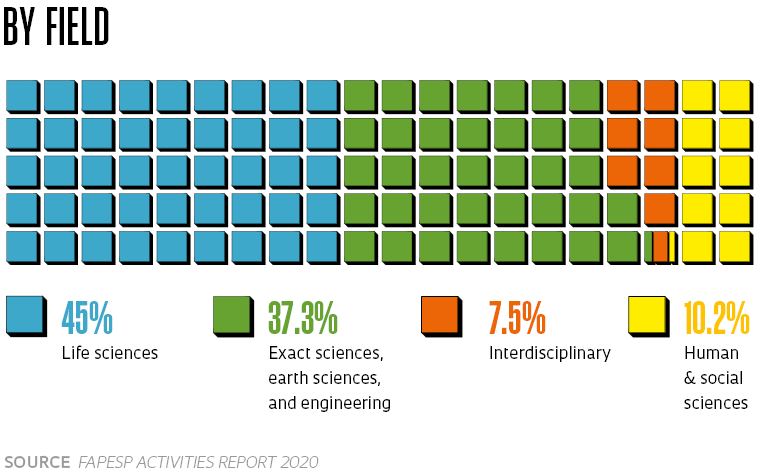
The field work of many researchers was compromised by COVID-19, but it did not hamper the state of São Paulo’s capacity to invest in science, technology, and innovation. In 2020, FAPESP’s revenues were R$1,441,294,746, close to the 2019 revenues of R$1,453,195,782. These financial resources come from two sources. The first and most significant is the transfer of 1% of all tax revenue from the state of São Paulo to scientific and technological development, as required by the 1989 São Paulo Constitution. In 2020, the State Treasury provided R$1,405,370,233 in funding, which was more than the R$1,350,534,401 transferred in 2019. The second revenue source is joint funding agreements with other institutions and companies and returns on investments, which totaled R$35,924,513 in 2020, well below the R$102,661,381 achieved in 2019.
In 2020, FAPESP allocated 46% of its funding to research for knowledge advancement, a category that includes short-term regular research grants and long-term basic and applied research projects conducted within the scope of Thematic Projects; Research, Innovation, and Dissemination Centers (RIDCs); Junior Researchers; São Paulo Excellence Chair (SPEC); and Special Projects. Twenty-three percent was allocated to training scientists and researchers—followed by research infrastructure (13%), research for innovation (10%), research on strategic topics (7%), and scientific communication, mapping, and review (1%). Regarding fields of knowledge, projects in life sciences were the most funded, with 45% of the funds invested by the foundation, followed by the exact and earth sciences and engineering (37.3%), human and social sciences (10.2%), and interdisciplinary research (7.5%).
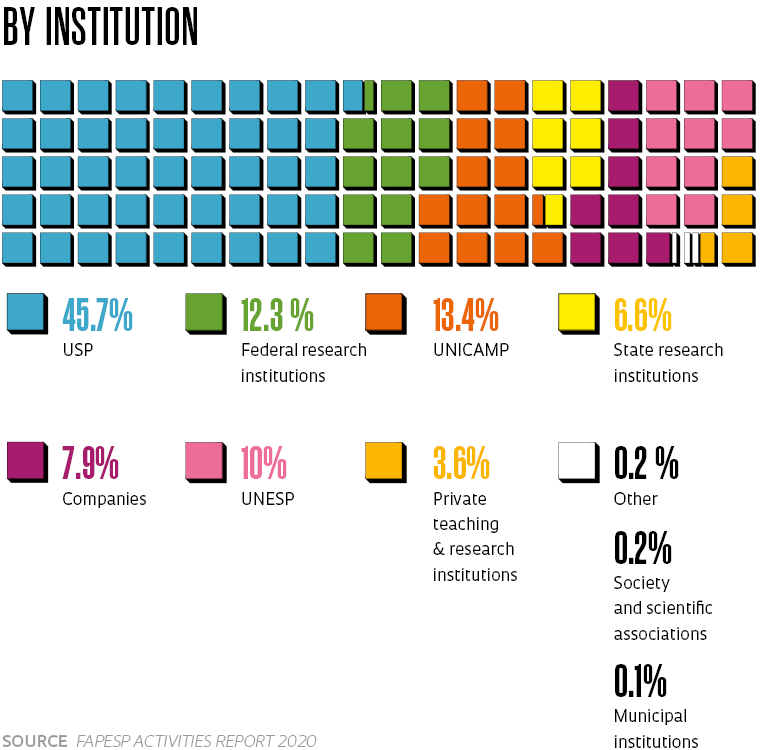
The foundation’s internal processes were refined in 2020 to increase research quality. Since September that year, all grant and scholarship applications have had to include a data management plan. The aim is to increase the transparency of data obtained during research, to allow them to be confirmed or reused by other scientists, which increases the reliability of scientific studies and prevents funding wastage. Data management plans, which have been required in some areas of funding since 2017, are now one of the documents analyzed when assessing scientific proposals and reports.
The Research for Innovation in Small Businesses program (RISB, or PIPE in Portuguese), which has funded research by 1,633 companies in São Paulo since 1997, strengthened its ties with the innovation ecosystem by replacing its system of issuing four calls for proposals per year with a continuous proposal analysis model. Applicants can now submit proposals whenever they choose. In 2020, the program invested R$76.7 million in 1,305 projects. It also created a new funding option called PIPE Invest, which allows private investors to contribute to projects ready for market to speed up sales. Recipient companies must demonstrate that private partners are investing at least R$100,000 in the project. “During phase 2 of the RISB program, FAPESP had already been suggesting that entrepreneurs seek out investors for the innovations they were developing through the program. PIPE Invest is an additional stimulus,” FAPESP’s head of research for innovation Patricia Tedeschi told Agência FAPESP.
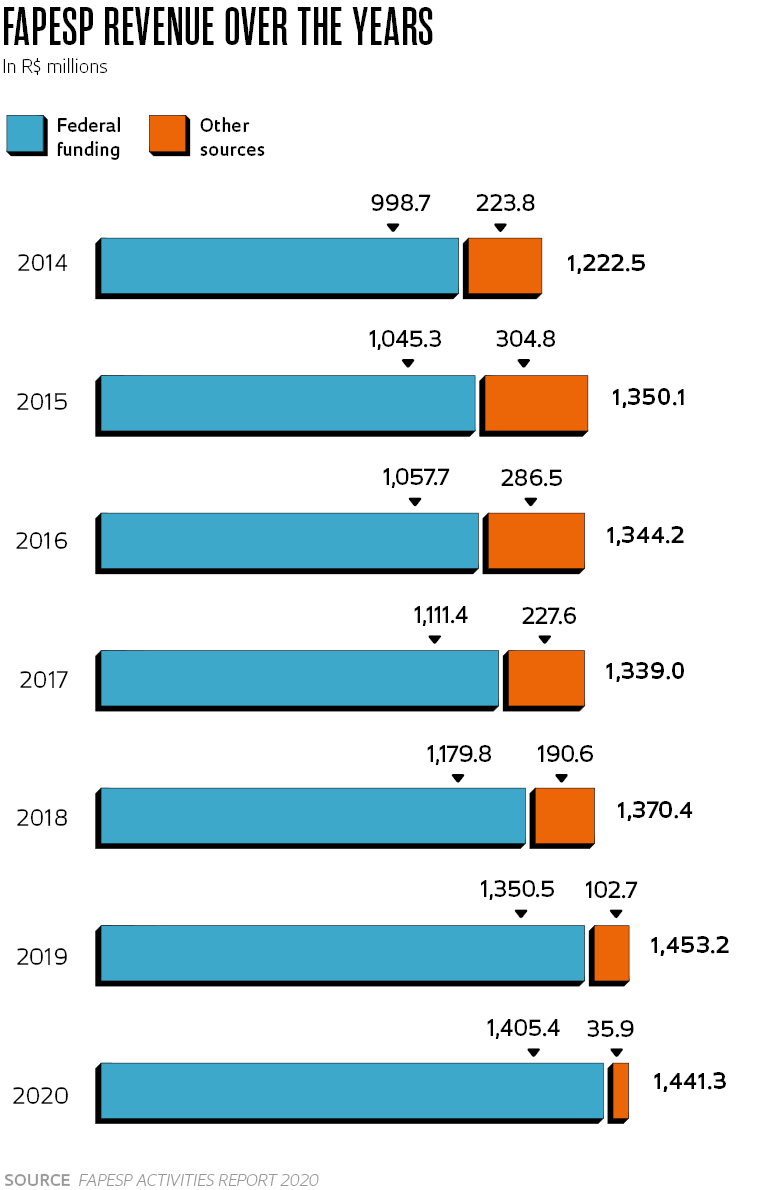
The foundation also make improvements with respect to one of its missions, which is to produce science, technology, and innovation indicators to guide its strategies and investments. A new methodology for calculating investments in research and development (R&D) was developed by FAPESP’s studies and indicators team, in partnership with the SEADE Foundation, providing a clearer picture of this line of funding, which is associated with the generation of knowledge, innovation, and wealth. The new model uses data from primary sources, covers a broader number of institutions, and is based on more refined data obtained from universities. “The criteria we are adopting are based on the Frascati Manual, written by the OECD [Organization for Economic Cooperation and Development] as a reference for organizations working with R&D statistics worldwide”, explained economist Sinésio Pires Ferreira, head of studies and indicators at FAPESP (see Pesquisa FAPESP issue nº 297).
At the end of the year, FAPESP announced the results of its call for proposals on science for development. The initiative is intended to fund the creation of 12 centers that will conduct problem-oriented research of social or economic relevance to the state of São Paulo in the fields of health, public safety, food, agriculture, economic development, and others. The centers will operate on a co-funding model involving government bodies, corporate or nongovernmental partners, and FAPESP. The Agronomic Institute (IAC) was one of the institutions that applied to the call for proposals. It is forming a network of researchers with the aim of using genome editing techniques to increase the quality and productivity of three agricultural crops of major economic importance in Brazil: coffee, sugarcane, and citrus (see Pesquisa FAPESP issue nº 305).
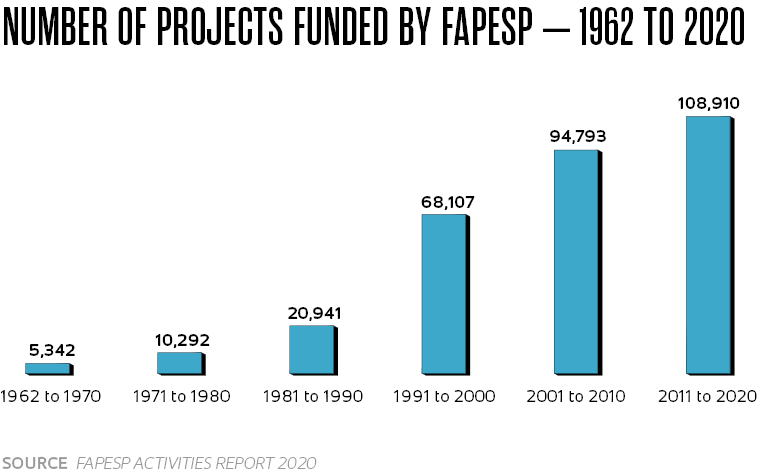
Another center, headquartered at Fundação Hemocentro de Ribeirão Preto, unites researchers from the Butantan Institute and the Ribeirão Preto School of Medicine at the University of São Paulo (USP) in a project designed to expand access to innovative cell therapies and immunotherapies for cancer patients, among other goals. “Mission-oriented research is a pathway to inclusive and sustainable economic development,” said Luiz Eugênio Mello, FAPESP’s scientific director, at the inauguration of the first 12 centers.
In 2020, the foundation invested R$16.7 million in Engineering Research Centers (CPEs) and Applied Research Centers (CPAs), created in partnership with companies. At these centers, R&D teams from corporations establish collaborations 5–10 years in length with scientists from universities and research institutes. The objective is to share knowledge and encourage application of the results. Two new CPEs were opened in 2020: the Artificial Intelligence Center, created by IBM in 2019 and based at the USP Innovation Center, and the Brazilian Center for Water Research, formed in partnership with the Campinas Water and Sanitation Company (SANASA) and based at the Institute of Chemistry of the University of Campinas (UNICAMP). In the same period, the Brazilian Center for Early Childhood Development was established in partnership with Fundação Maria Cecilia Souto Vidigal, headquartered at INSPER.
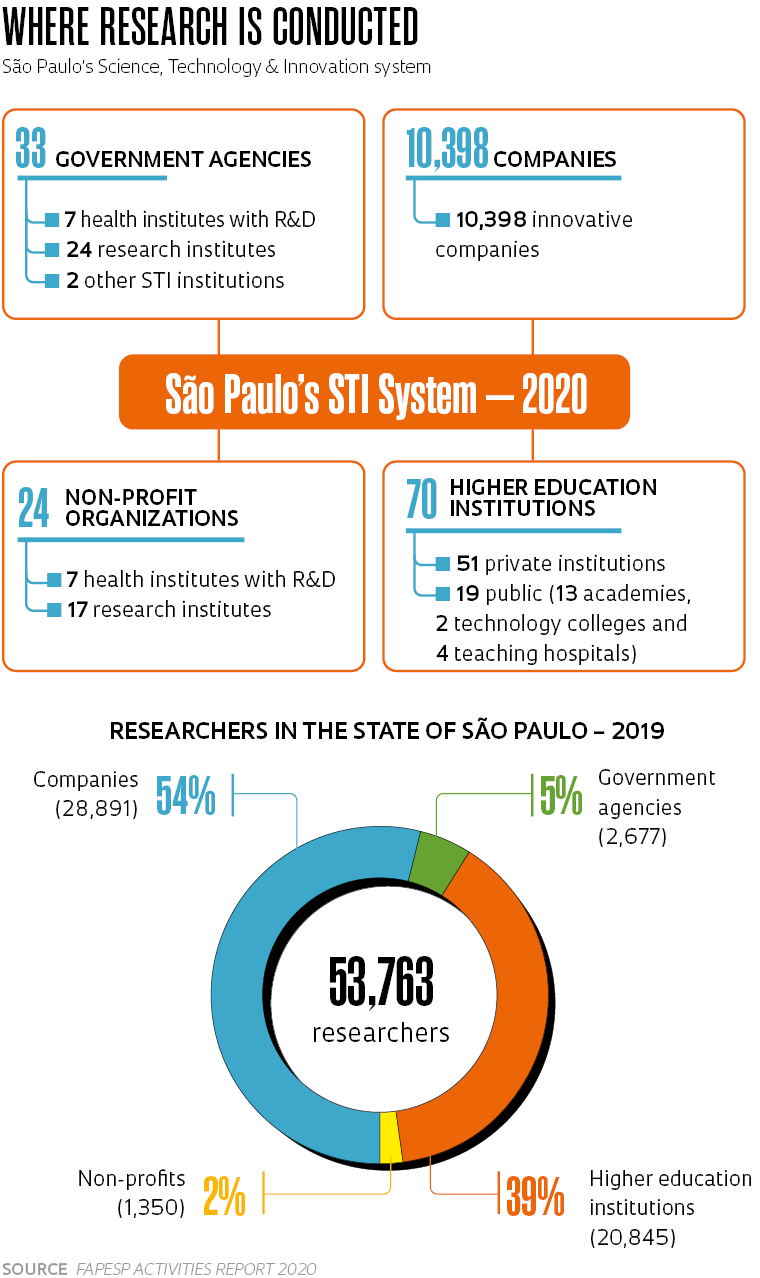
In November, FAPESP and pharmaceutical company GSK announced a new call for proposals to create a Center for New Therapeutic Targets in Oncology, with the aim of searching for innovative new cancer treatments. It is the third partnership between FAPESP and the pharmaceutical within the scope of the CPEs/CPAs—previous collaborations related to the Center of Excellence for Research in Sustainable Chemistry and the Center of Excellence for Molecular Target Discovery. The process of selecting proposals from the 2019 call for six applied research centers in artificial intelligence, in partnership with the Brazilian Ministry of Science, Technology, and Innovation (MCTI) and the Internet Steering Committee in Brazil (CGI.br), also began in 2020.
As a result of social distancing, the dialogue and exchanges of information traditionally promoted by FAPESP moved online: 62 online seminars were held between March and December 2020, with around 11,000 researchers participating in Brazil and abroad. One of the highlights was FAPESP’s COVID-19 Research Webinars series, which has hosted 15 meetings with specialists from Brazil and abroad to discuss various topics related to the pandemic since May 2020. Another was the series of nine virtual seminars celebrating the 20th anniversary of the Biota Program, which has helped broaden our understanding of biodiversity and provided a scientific basis for environmental conservation policies and guidelines. Over the course of two decades, Biota has awarded 293 grants and scholarships to more than 1,200 researchers, resulting in more than 3,000 scientific articles published.
